President-elect Donald Trump met with President Obama as he prepares to transition into the White House.
- Trump and Obama talked at length and offered uncharacteristic praise for each other
- An immigration hard-liner is joining Trump’s transition team
- Trump’s Muslim ban was removed from his website, but it’s back
- For Democrats, now what?
- The glass ceiling for Hillary Clinton and women turned out to be a concrete wall
- Anti-Trump protestoes shut down the 101 Freeway in L.A., as protests broke out around the nation
- Share via
Portland anti-Trump protest now considered a riot, police say
- Share via
President-elect Trump addresses protests for first time, accuses media of inciting them
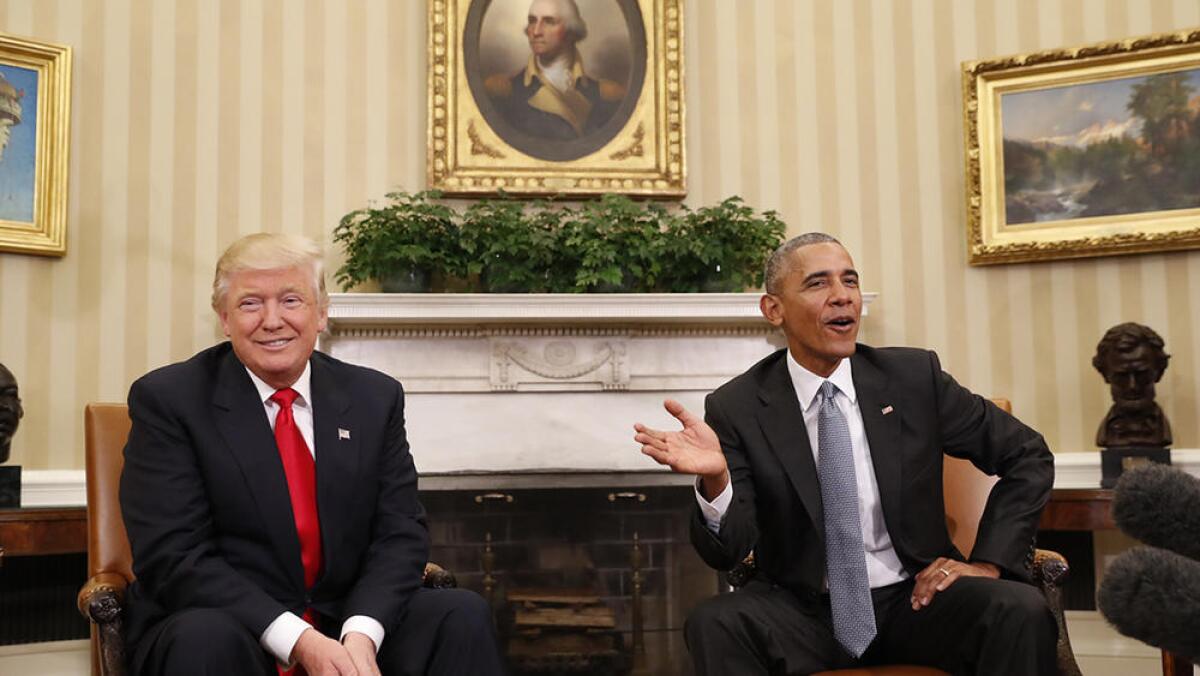
As protesters upset by his victorious campaign fanned out in cities nationwide on Thursday, President-elect Donald Trump addressed the demonstrations for the first time.
In a tweet, he called the protests “unfair” and accused the media of emboldening the unrest.
Nationwide, from Philadelphia to Los Angeles, people took to the streets Wednesday and Thursday nights to protest Trump, whose charged rhetoric during the campaign targeted, among others, Mexican immigrants, Muslims and women.
Earlier on Thursday, Trump visited with President Obama inside the Oval Office for a meeting that both men described as positive.
In a separate tweet, Trump lauded Obama, saying the two had great “chemistry” in their first meeting and that his wife, Melania, really liked first lady Michelle Obama.
Four years ago, Trump also used Twitter to encourage protests against Obama’s re-election.
- Share via
Trump says he and Obama had ‘chemistry’
- Share via
The Ku Klux Klan says it will hold a Trump victory parade in North Carolina
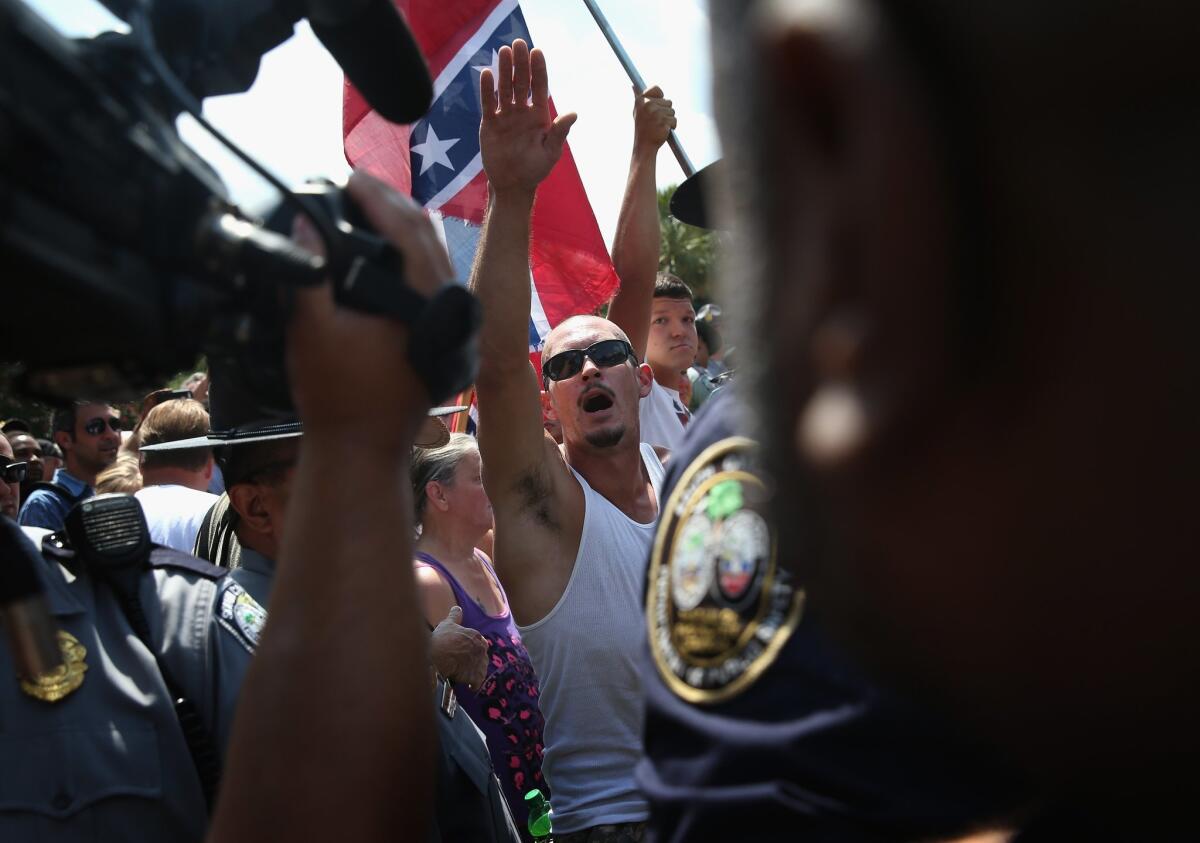
One of the largest Ku Klux Klan groups in the country has announced a parade to celebrate President-elect Donald Trump’s win.
The Loyal White Knights of Pelham, N.C., says on its website that its parade will take place on Dec. 3.
“TRUMP = TRUMP’S RACE UNITED MY PEOPLE,” says the website’s front page.
No time or location for the event is listed, and a phone call to the number on its website was not returned.
The group has between 150 and 200 members and is “perhaps the most active Klan group in the United States today,” according to the Anti-Defamation League. Last year, it was part of a South Carolina protest against the Confederate flag’s removal from the state Capitol.
Several Klan groups endorsed Trump. Well-known former Klan leader David Duke, who on Tuesday lost a Senate bid in Louisiana, was also a vocal supporter.
The Trump campaign was criticized this year for initially refusing to denounce support from the Klan. Later, the campaign described the Klan’s efforts as “repulsive.”
- Share via
New York mom runs into Hillary Clinton on a hike
- Share via
An immigration hard-liner is joining Donald Trump’s transition team
One of the architects of several of the nation’s most controversial immigration laws is set to join President-elect Donald Trump’s immigration policy transition team.
Kansas Secretary of State Kris Kobach said Thursday that he planned to help Trump reverse President Obama’s immigration policies.
“There’s going to be a lot to do there in part because Mr. Trump and Mr. Obama are diametric opposites when it comes to immigration policy, so there will be a lot of changes,” Kobach told a Kansas television station.
Noting Trump’s central campaign pledge to build a southern border wall and emboldened by Republicans’ retaining control of Congress, Kobach said, “There’s no question the wall is going to get built. The only question is how quickly will it get done and who pays for it.”
Trump, who met with Obama at the White House on Thursday, also has vowed to overturn many of the president’s executive actions on immigration, such as Deferred Action for Childhood Arrivals that temporarily shields from deportation people who were brought to the U.S. illegally as children.
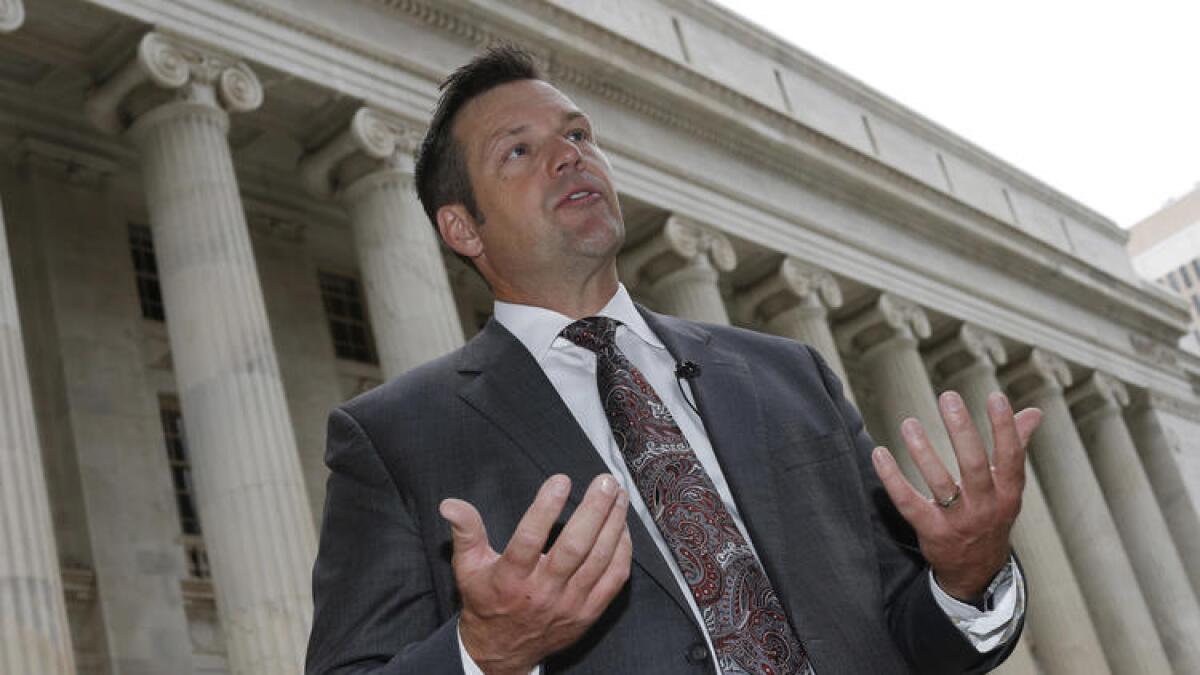
In 2010, Kobach helped to craft Arizona’s SB-1070, which contained four major elements aimed at reducing the number of immigrants in the state illegally through attrition. It compelled police to ask for papers and allowed officers to make arrests without warrants if they believed the suspect committed an offense that made them eligible for deportation.
Critics assailed SB-1070 as racial profiling, and the Supreme Court struck down much of the law in 2012, although it upheld the part allowing police to check immigration statuses. In September, Arizona ended its practice of requiring police officers to demand the papers of people suspected of being in the country illegally as part of a settlement with immigrant rights groups.
Kobach also has had a hand in other controversial immigration laws. He helped write an Alabama measure in 2011 that mandates that police who suspect someone is in the country illegally can work to determine that person’s legal status. Critics have called it tougher than the Arizona law.
Kobach also helped local officials in Hazelton, Pa., draft a 2006 ordinance that banned landlords from renting to people in the country illegally. The ordinance, which never was implemented, faced strong pushback and several legal challenges by the American Civil Liberties Union. Last year, the rural town was ordered to pay nearly $2 million in legal and court fees to the ACLU.
California Secretary of State Alex Padilla said it was deeply troubling that Kobach was joining Trump’s transition team.
“His participation is a threat to diverse communities throughout our nation. Kobach’s pattern of supporting racist, anti-immigrant policies ... are not only divisive, but have repeatedly been found unconstitutional,” he said. “Mr. Trump’s selection of Kobach is in direct conflict with his stated desire to bring America together.”
- Share via
Panorama: President-elect Donald Trump and President Obama meet in the White House
- Share via
Donald Trump’s Muslim ban was removed from his website, but it’s back
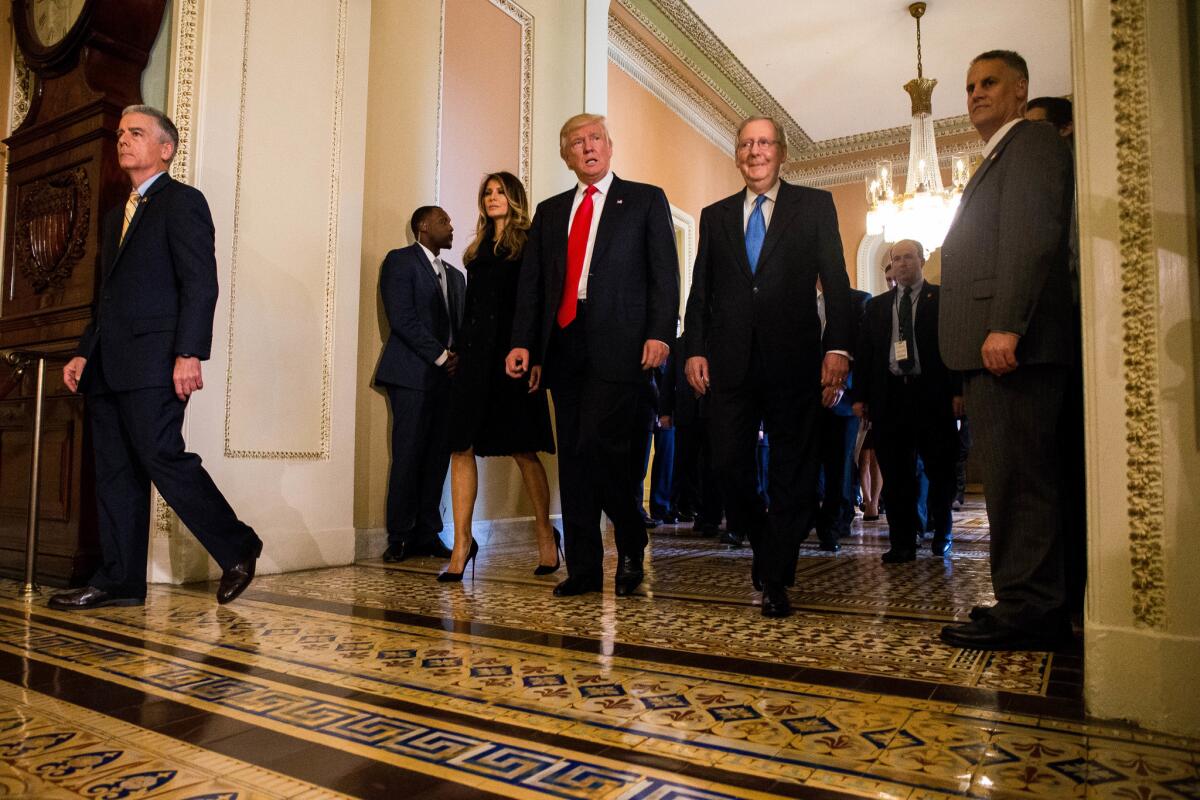
Donald Trump’s pledge to deny entry to the country for all Muslims temporarily disappeared from his campaign website after lingering there since December, following the attacks in San Bernardino.
The removal prompted new questions about one of Trump’s most controversial promises.
But it was restored Thursday afternoon after what Trump’s staff characterized as a technical glitch.
“The website was temporarily redirecting all specific press release pages to the homepage. It is currently being addressed and will be fixed shortly,” the campaign told the Washington Post.
Trump’s promise helped him win the GOP primary, while drawing criticism from people who said it ran counter to American values of religious tolerance. In recent months, Trump has suggested that he would revise it to instead target people from countries linked to terrorism, rather than use religion as a criteria. But he had not, until recent days, removed the initial statement from his website.
Thursday, as he was strolling the Capitol with congressional leaders, he walked away from reporters who asked whether the plan to ban Muslims remained on his agenda.
- Share via
Trump welcomed to Capitol Hill where Speaker Ryan says Republicans are ready to ‘make America great again’
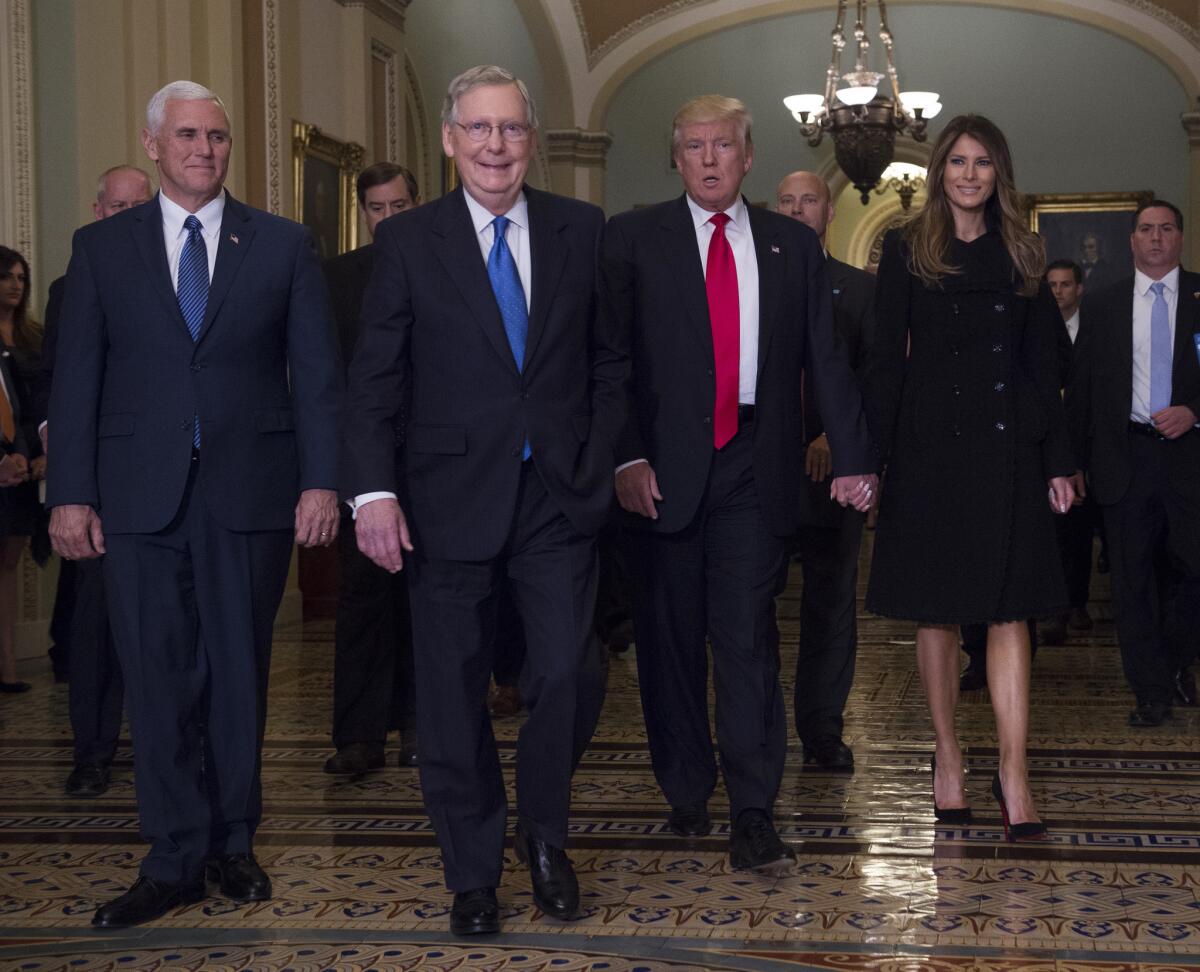
President-elect Donald Trump visited with GOP leaders on Capitol Hill on Thursday in talks seemingly more welcoming than past ones that ended up as sparring matches between the then-candidate and Republicans.
House Speaker Paul D. Ryan (R-Wis.) showed Trump and his wife, Melania, the view from the balcony overlooking the national Mall, noting the area below where the president will be sworn into office on inauguration day.
Ryan also pointed in the distance to the clock tower of the businessman’s new Trump-branded hotel on Pennsylvania Avenue.
Afterward, Ryan, picking up Trump’s campaign slogan, said they talked about how to “make America great again.”
“We are now talking about how we are going to hit the ground running to get this country turned around,” Ryan said.
Trump told reporters later he was focused on immigration, healthcare and jobs — “big league jobs” — after his meetings on the Hill.
“We are going to absolutely [do] spectacular things for the American people and I look forward to starting — quite frankly we can’t get started fast enough,” Trump said.
Trump and Vice President-elect Mike Pence had lunch with Ryan at the Capitol Hill Club, the Republican Party’s headquarters, before heading to talks under the dome.
Trump and his team met with Senate Majority Leader Mitch McConnell (R-Ky.), who expressed his interest in getting started on the work ahead.
Trump paused in the Senate hallway to take a few questions from reporters staking out the session.
“We have a lot to do,” Trump said, cutting the session short when asked if he would have Congress pass a law banning Muslims from entry into the United States.
“Thank you, everybody,” Trump said.
The meetings were photo ops of Republican unity after the divisive election season when Ryan and other top leaders criticized Trump’s inflammatory rhetoric, including his race-based comments.
At an earlier trip to Capitol Hill, Trump sparred with Republican senators who questioned his policies and positions.
But a detente has begun as Trump begins his transition to the White House and congressional Republicans hope to capitalize on one-party governance to enact policies opposed by Democrats.
Trump has promised on his first day in office to tackle many issues by administration actions, and Republicans appear relieved to outsource legislating on some of the president-elect’s most controversial proposals to the White House — bypassing the need for tough votes.
- Share via
Before they were all smiles in the Oval Office, Obama and Trump had mostly insults for each other

A disaster. Unfit to lead. The founder of a terrorist group.
As President Obama and President-elect Donald Trump sat in the Oval Office on Thursday, lauding each other and vowing to work together, they brushed aside such polarizing rhetoric, which both frequently employed on the campaign trail.
Here are some of the highlights — or lowlights — of the insults they hurled at each other:
“The Republican nominee is unfit to serve as president. ... He’s woefully unprepared to do this job.”
— Obama in the East Room of the White House in August after Trump publicly battled with a Muslim Gold Star father, Khizr Khan, whose son, Humayun, an Army captain, was killed by a car bomb in Iraq in 2004.
“President Obama has been the most ignorant president in our history.”
— Trump in July, an assertion he would repeat on the campaign trail to raucous crowds.
“If somebody can’t handle a Twitter account, they can’t handle the nuclear codes.”
— Obama, in what was a critical component of his closing argument for Hillary Clinton. At a rally in Florida over the weekend, the president hammered home the notion that Trump is temperamentally unfit to be president.
“He’s the founder of ISIS.”
— Trump on Obama in August. He blamed Obama and Clinton for emboldening the Islamic State through failed policies in Iraq and Afghanistan.
“If you start whining before the game’s even over ... then you don’t have what it takes to be in this job.”
— Obama in the Rose Garden last month as Trump began saying the election would be rigged.
“He has been a disaster.”
— One of Trump’s frequent insults of Obama. Still, when talking to the press Thursday in the Oval Office, Trump said he had “great” respect for the outgoing president.
- Share via
Giuliani suggests that Trump could build a border wall without getting approval from Congress
The GOP Senate leader, Sen. Mitch McConnell, has said there’s much that President-elect Donald Trump can do without Congress.
Turns out Trump’s promise to build a wall along the border with Mexico may be one such act.
Trump advisor Rudolph W. Giuliani said Thursday that the Trump administration could begin building the wall with executive action, rearranging money already approved by Congress for other aspects of immigration enforcement.
“He can do it by executive order by just reprogramming money,” Giuliani told CNN.
Congress, he said, has already approved a wall “to certain portions of the border that hasn’t even been built yet. So you could take a year building that out with what has been approved.”
President Obama’s use of executive power, including immigration actions that temporarily shield law-abiding immigrants from deportation, roiled Congress as an overreach. Some Republicans sued to stop him.
Now, however, Trump’s use of executive authority to accomplish his goals may come as a welcome relief for Republicans. Outsourcing the work to the White House would relieve Congress of taking tough votes on controversial issues that lawmakers might rather avoid.
- Share via
Trump and Obama meet for the first time and emphasize cooperation

President Obama and Donald Trump discuss their visit at the White House
President Obama met for more than 90 minutes with President-elect Donald Trump in the Oval Office on Thursday, an unexpectedly lengthy encounter that ended with both men offering uncharacteristic praise for each other.
Obama, calling their discussion an “excellent conversation,” said he was “encouraged” by Trump’s interest in working with his administration as the president-elect prepares to address the nation’s challenges.
“I want to emphasize to you, Mr. President-elect, that we now are going to want to do everything we can to help you succeed,” Obama said before a scrum of reporters ushered into the Oval Office after the meeting.
Noting that it was the first time they’d met, Trump called it an “honor” to have met with Obama, adding that he hoped they would continue to meet and that he would seek Obama’s counsel after he leaves office.
“I have great respect,” Trump added, describing their conversation as a discussion of some “wonderful” issues and some “difficulties” ahead.
Though both men had spent the day and a half since Trump’s election emphasizing a peaceful transition of power, the atmosphere surrounding it was more fraught. Trump campaigned on a repudiation of the Obama years, and Obama spent months calling the GOP nominee unfit for the presidency.
And, of course, Trump was the most prominent backer of the birther movement, which sought to undermine Obama’s presidency by lying about his birthplace.
But as the two sat in the wing chairs of the Oval Office, a pairing reserved for heads of state, they were deferential and polite, appearing committed to their new joint project – the peaceful transition of power.
“My number one priority in the coming two months is to just facilitate a transition that ensures our president-elect his success,” Obama said.
Trump said after the meeting that “as far as I’m concerned, it could have gone on for a lot longer.”
Then he leaned forward and offered his hand, and the two men shook for the cameras.
10:20 a.m.: This story was updated with more comments from the meeting.
- Share via
Donald Trump trashed the political playbook. Then he made up his own set of rules.
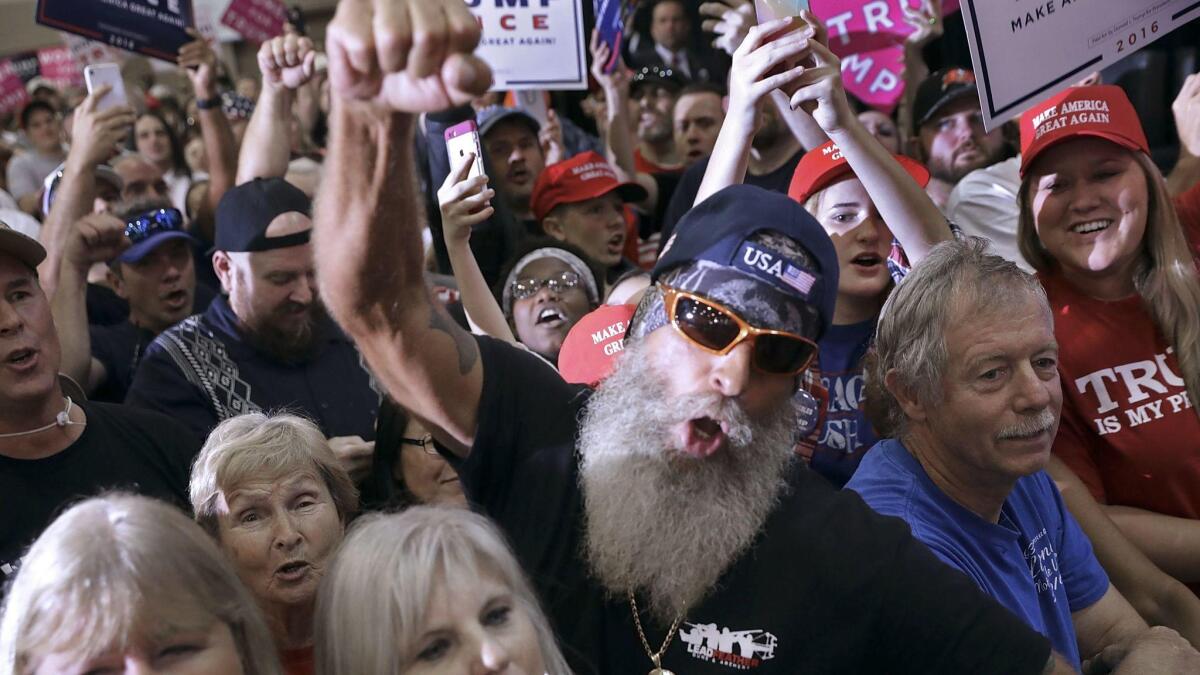
Donald Trump’s presidential victory defied just about everything supposedly smart people knew about politics and winning the White House.
Not that it mattered.
He prevailed by tapping a force that was far more powerful than the strongest debate performance, the most attention-grabbing TV spot, the savviest turnout operation or the highest-profile surrogates, from the White House down.
He tapped into seething anger and voters’ ravenous desire for change.
If people get mad enough, they will storm the polls without prodding — and without, apparently, the need to confide in opinion pollsters, who largely missed the huge outpouring of Americans displaced by decades of economic restructuring and unsettled by the country’s changing complexion and shifting cultural mores.
If people get mad enough, they will look past a candidate’s overt prejudice, his coarse put-downs of women, his mockery of a disabled journalist, his taunting of a Gold Star family.
- Share via
President-elect Trump arrives at the White House to meet with Obama
President-elect Donald Trump has arrived at the White House on Thursday for a private meeting with President Obama, marking a ceremonial start to the transfer of power between two political rivals.
Trump, who traveled this morning from New York to the nation’s capital in his private plane, arrived with his wife, Melania, at the White House’s diplomatic entrance, out of the public eye.
Obama and Trump were to meet in the Oval Office to discuss what both envision as a smooth transfer despite the pitched rhetoric about one another during the campaign, and well before.
Vice President Joe Biden was also to meet with Vice President-elect Mike Pence at the White House. And First Lady Michelle Obama is hosting Melania Trump in the White House’s East Wing.
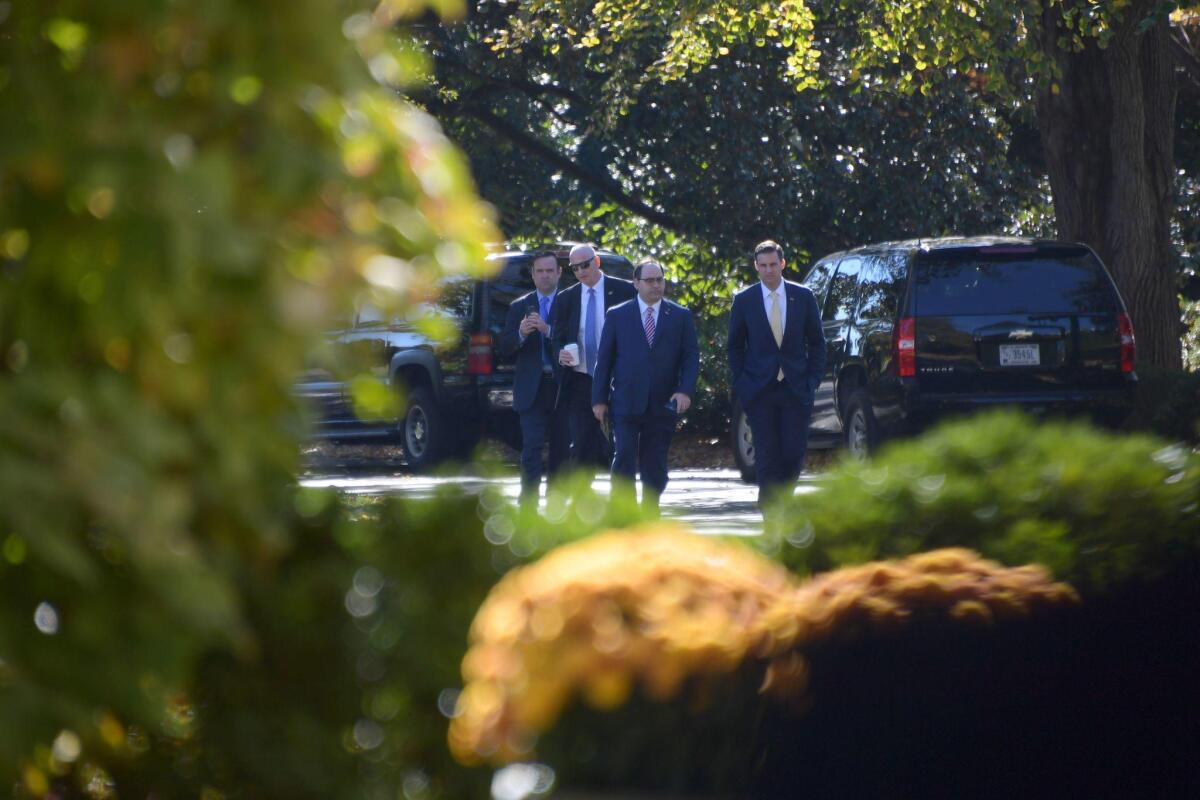
Later, Trump will travel to Capitol Hill for separate meetings with House Speaker Paul D. Ryan (R-Wis.) and Senate Majority Leader Mitch McConnell (R-Ky.).
Obama said Wednesday that he hoped to provide the same “professional” and “gracious” treatment of Trump during the transition period that President George W. Bush offered him.
“One thing you realize quickly in this job is that the presidency, and the vice presidency, is bigger than any of us,” Obama said.
“The peaceful transition of power is one of the hallmarks of our democracy. And over the next few months, we are going to show that to the world.”
- Share via
Trump transition team launches website, Twitter account
President-elect Donald Trump and his team launched his White House transition website and official Twitter account Wednesday.
The site, greatagain.gov, starts to break down how Trump will prepare to take over the role from President Obama in the next two months before January’s inauguration. It details the incoming Trump administration’s plans for “Making America Great Again” — securing the U.S.; reforming taxes, trade, transportation infrastructure, healthcare, veterans administration and finances; and building the wall on the U.S.-Mexico border.
Visitors can also read through the backgrounds of the president-elect and Vice President-elect Mike Pence. And they can submit their own stories and what they want Trump to address in his new role.
The transition team Twitter handle @transition2017 had nearly 12,000 followers as of Thursday morning.
- Share via
Trump’s advisors say nation should give the president-elect a ‘fresh start’ from his heated campaign rhetoric
After years of controversy and insults, Donald Trump’s advisors tried to wipe the slate clean in television interviews on Thursday as he prepares for the presidency.
“There will be a fresh start,” Michael Cohen, a lawyer for the Trump Organization, said on CNN’s “New Day.”
He said there was no animus toward Mexicans or Muslims, whom Trump derided on the campaign trail. And addressing the thousands of people across the nation protesting Trump’s election, Cohen said, “Please give him a chance. Wait to see before you make your decision.”
New Jersey Gov. Chris Christie told NBC that the controversy over birtherism, Trump’s lie about President Obama’s birthplace in an attempt to undermine the legitimacy of his presidency, would also fade.
“That’s all past us,” said Christie, the chairman of Trump’s transition team.
Rudolph Giuliani, the former New York mayor and federal prosecutor, saw one issue on which a Trump administration may not turn the page — investigating Hillary Clinton and her family’s foundation.
“I don’t like to see America become a country where we prosecute people because of politics,” he said on Fox News. At the same time, he said, “there are deep and disturbing issues there.”
Giuliani later told CNN that Trump would still pursue a wall along the U.S. border with Mexico.
“He’s not going to break a campaign promise,” he said.
- Share via
Biden: A Trump presidency won’t diminish U.S. support for Israel
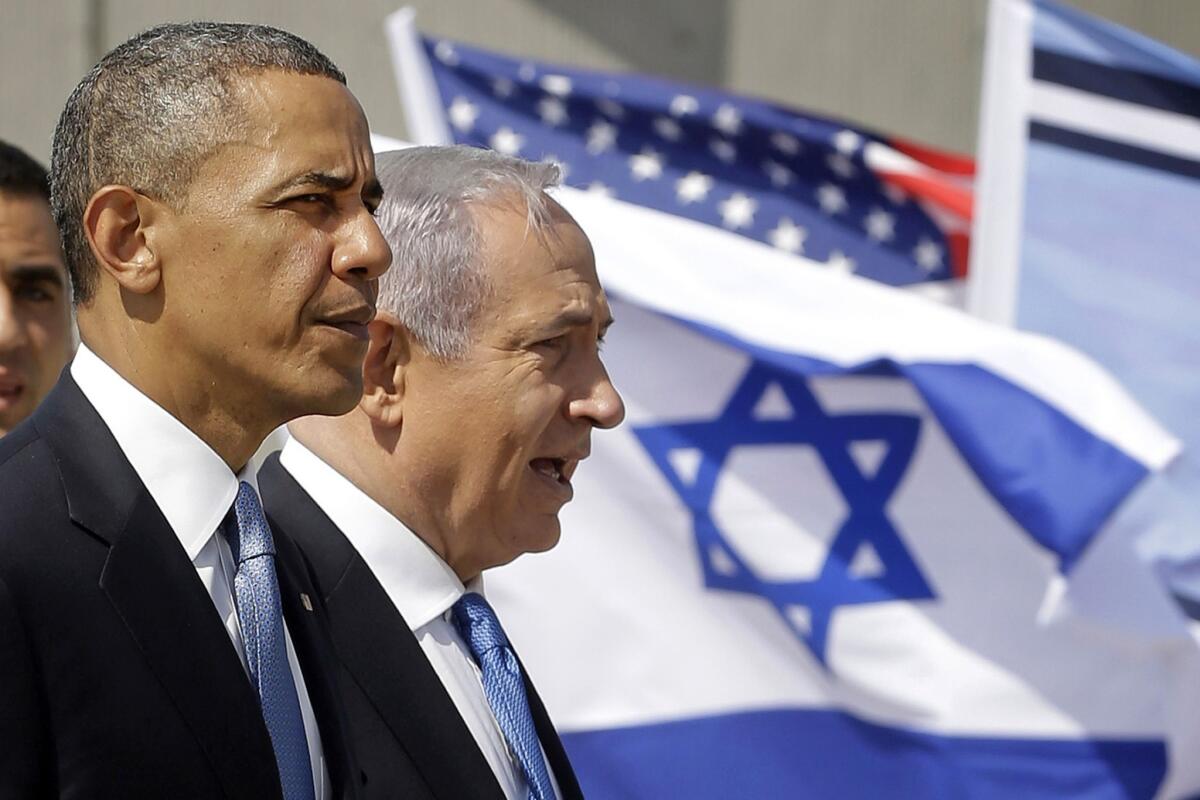
Vice President Joe Biden assured Jewish leaders that U.S. support for Israel will remain strong under President-elect Donald Trump, no matter his views.
Speaking before the World Jewish Congress on Wednesday, Biden tried to quiet rumbling fears that U.S. backing for Israel would waver under a Trump administration after Trump’s campaign stoked anti-Semitic support around the country.
“Even if the new administration were inclined to reduce the commitment, which it is not, Congress would never let it happen,” Biden said at the group’s gala in New York City. “The American people would never let it happen.”
The U.S. recently pledged $3.8 billion in military support for Israel. Hours after Trump’s election, he invited Israeli Prime Minister Benjamin Netanyahu for a visit. He has also denounced the nuclear deal between Iran and six world powers, an agreement that caused tension between President Obama and Netanyahu.
“In the Trump administration, there will be no diminution of support as a consequence of this transition,” Biden said.
- Share via
For reeling Democrats, now what?
As they struggled through the wreckage of one of their worst election nights in memory, Democrats faced a brutal reckoning over how the party, soon to be out of power on both ends of Pennsylvania Avenue, can regain relevance.
Democrats went into Tuesday’s balloting presuming that they would win the presidency for a third time in a row, gain a majority in the U.S. Senate and, if everything went well, cut into Republicans’ congressional margins, too.
Nothing went well.
Not only did Hillary Clinton suffer defeat at the hands of Donald Trump, but a tide of conservative voters swamped Democrats at other levels.
- Share via
That glass ceiling? It turned out to be a concrete wall
It turned out that the ceiling was made not of glass, but reinforced concrete.
At least that is what it felt like to many women who had been getting ready Tuesday to pour champagne in celebration of the first female president of the United States.
It soon became clear that the nation’s 45th U.S. president would be the 45th man to hold the title, and Hillary Clinton, the woman many had expected to break the biggest gender barrier of them all, would be an also-ran for the nation’s highest office.
- Share via
Trump win sparks student walkouts and protests across the U.S.: ‘I expected better’
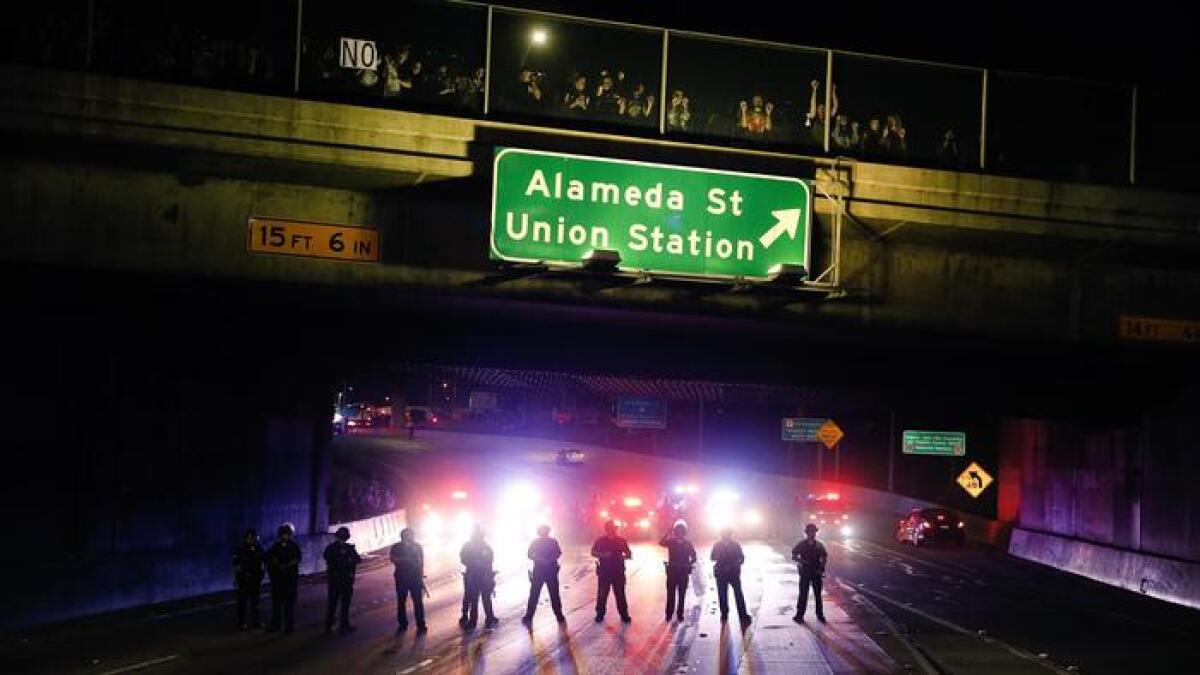
Donald Trump’s victory in the presidential election sparked protests across the nation Wednesday, with crowds marching through city streets, rallying at college campuses and staging walkouts at schools in an open disavowal of the president-elect.
Students at several Bay Area high schools got up from their seats in the middle of class and filed out. A throng of more than 1,000 young protesters gathered on the steps of Los Angeles’ City Hall, burning a giant Trump head in effigy and blocking traffic along Spring and 1st streets.
“I expected better of my electorate,” Vishal Singh, 23, said in downtown L.A. late Wednesday. He said he was reeling over the support for a man he saw as opposed to immigrants and LGBT rights. “I thought this country was different.”
- Share via
In wake of Trump’s win, even some in Silicon Valley wonder if Facebook has grown too influential
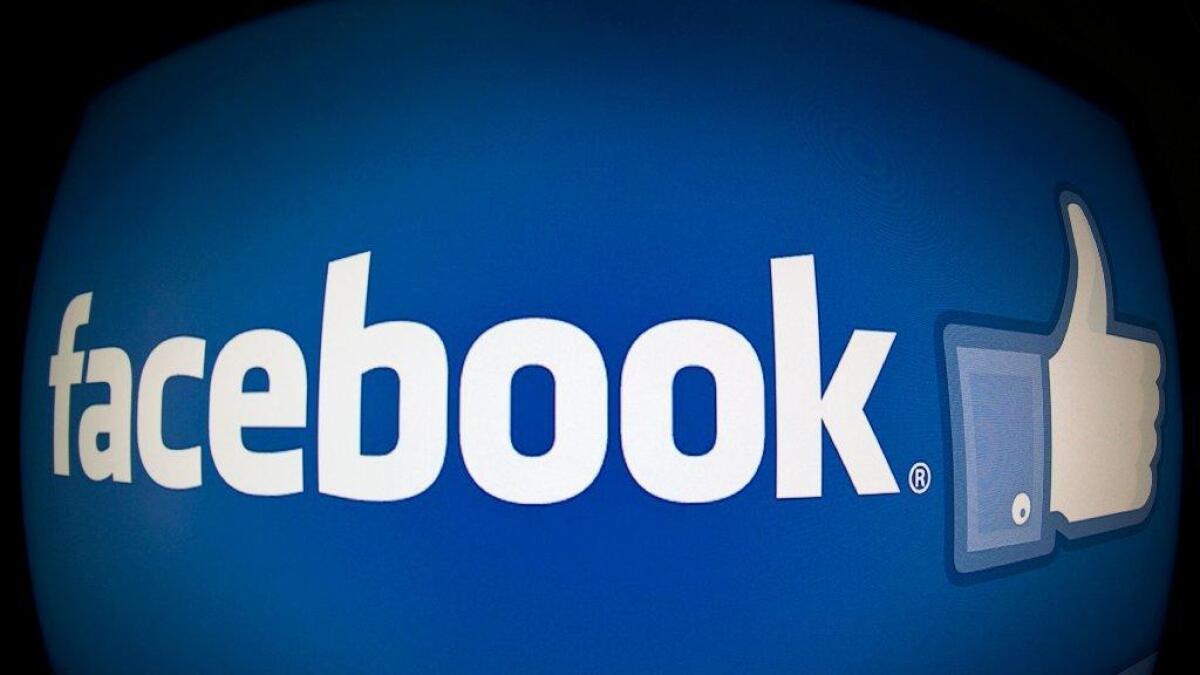
Hillary Clinton was the choice of nearly every American newspaper editorial board. It didn’t matter.
When it comes to influencing public opinion, the 2016 presidential election demonstrated with sobering effect the weakening role of traditional media and the ascendant power of social networks like Facebook.
Forty-four percent of Americans get their news from Facebook, according to the Pew Research Center, filling a void left by the declining ranks of newspapers. By comparison, only 2 in 10 U.S. adults get news from print newspapers today.
The consequences of Facebook’s growing sway became clear during an election cycle that saw the rise of partisan news, conspiracies, fake articles and a winning candidate who fully embraced social media as a way to circumvent the media establishment and its proclivity for checking facts.